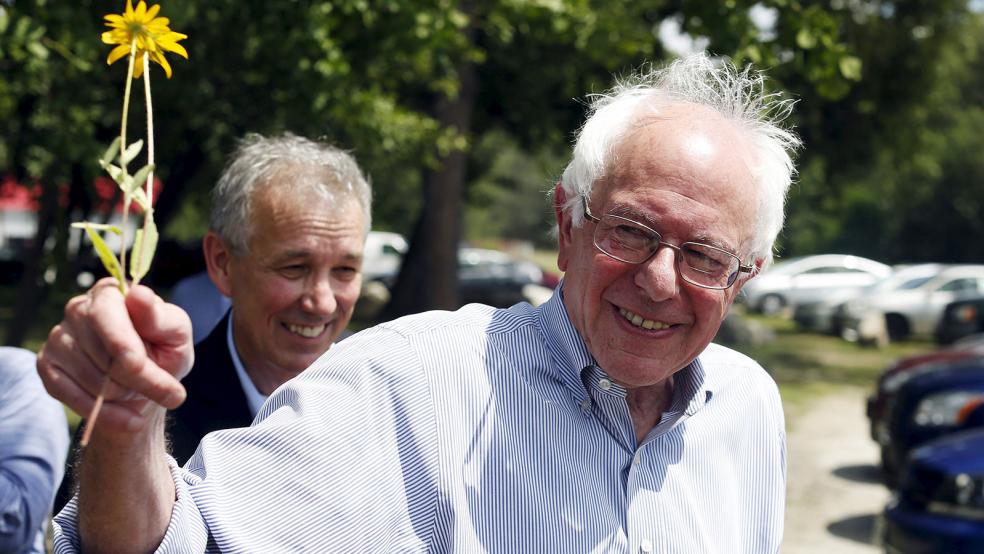The squabble within the Democratic Party over whether Sen. Bernie Sanders’ massive tax and spending measures “add up” escalated on Wednesday with the release of a letter from four former chairs of the White House Council of Economic Advisers saying that the Vermont senator’s claims of economic benefit strain credulity.
Sanders has been under fire from Hillary Rodham Clinton, his rival for the Democratic presidential nomination, for promoting highly ambitious plans for “Medicare for all,” free college tuition, universal family and sick leave and more that would expand the size of government by at least 40 percent and drive up the national debt.
Related: Sanders’ Health Care Plan Would Cost $13.8 Trillion Over a Decade
A number of prominent liberal economists have also sharply questioned a recent analysis by University of Massachusetts-Amherst economist Gerald Friedman that estimates that Sanders’ overall spending and tax increase plan would reduce the unemployment rate to 3.8 percent and boost the Gross Domestic Product by 5.3 percent – both highly ambitious goals.
"We are concerned to see the Sanders campaign citing extreme claims by Gerald Friedman about the effect of Senator Sanders's economic plan — claims that cannot be supported by the economic evidence," wrote economists Austan Goolsbee, Alan Krueger, Christina Romer and Laura D'Andrea Tyson. "These claims undermine the credibility of the progressive economic agenda and make it that much more difficult to challenge the unrealistic claims made by Republican candidates.”
Goolsbee, Krueger and Romer all served in the administration of President Obama, who has made little secret of the fact that he favors Clinton for the 2016 Democratic presidential nomination, while Tyson served in the administration of Clinton’s husband, former President Bill Clinton.
Warren Gunnels, a senior policy adviser to Sanders, told National Public Radio that these four economists are "the establishment of the establishment" and noted that Sanders’ campaign boasts of a long list of academics and health care activists who endorse his national health care plan.
Related: Sanders’ Plan Would Raise Taxes a Staggering $13.6 Trillion over a Decade
But other liberal-leaning economists with no association with either of the Democratic campaigns told The New York Times this week that while they are sympathetic to Sanders’ goals, they question his math and political realism. They warn that even with Sanders’s proposals to raise as much as $14 trillion in new tax revenue over the coming decade, there wouldn’t be enough to cover the cost of his single-payer, national health care program.
A new analysis by the non-partisan Tax Foundation of Sanders’ proposal to target wealthy Americans and Wall Street for steep hikes in their tax rates estimated that it would raise tax revenue by $13.6 trillion over the coming decade using the most conservative estimates. However, because Sanders’ fiscal policies likely would set back the economy in the coming year, his tax proposals would ultimately collect only $9.8 trillion over the next ten years.
Even if the Sanders tax plan raised as much as $14 trillion, some economists critical of his math say that there is no way it would be enough to cover the cost of the universal health care plan, let alone his other proposals. Economists say that Sanders’s agenda would add $2 trillion to $3 trillion a year on average to the cost of government.
Kenneth E. Thorpe, a veteran health policy economist who advised Hillary and Bill Clinton in the 1990s, recently issued a study concluding that Sanders had grossly underestimated the cost of his national health care plan while exaggerating the savings that could be squeezed out of the health care system, especially prescription drug costs.
Related: Study Challenges Clinton’s Tax Plan for $1 Trillion in New Spending
Thorpe in recent years worked with Democratic Vermont Gov. Peter Shumlin in exploring the possibility of creating a state-based single payer plan, but Shumlin and state lawmakers concluded it would be too costly for Vermont residents to pursue. After studying Sanders’ far more generous health care plan for all Americans, Thorpe calculated that it would cost $27 trillion over the coming decade, or nearly twice as much as Sanders’ advisers have estimated.
“Their savings are just implausibly too large,” Thorpe told The Fiscal Times.





